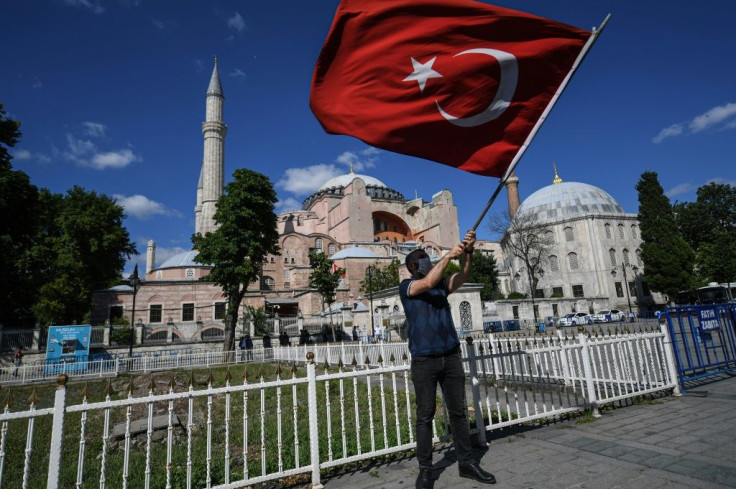Hagia Sophia, Roman Empire's First Christian Cathedral, To Be Converted Into A Mosque
Turkish president Recep Tayyip Erdogan on Friday ordered the historic Hagia Sophia, a mosque and former cathedral that dates to the Roman Empire, to be returned to its status as a mosque. The order follows the top administrative court in Turkey annulling an 85-year-old presidential decree that had turned the mosque into a museum.
Erdogan used a presidential decree of his own to transfer the management of the site from the Ministry of Culture to the Presidency of Religious Affairs. This paves the way for the conversion, a move that Erdogan has supported.
Historical highlights of the Hagia Sophia begin with the days of the Roman Empire:
- 532-537 A.D.- It was the Roman Empire's first Christian cathedral and is among the best-known Byzantine structures in the world. It was built as the cathedral church of Constantinople.
- 1453 - After the fall of Constantinople to the Ottoman Empire, it was converted from a Greek Orthodox cathedral into a mosque. The Ottomans also changed the city's name to Istanbul.
- 1935 - Mustafa Kemal Atatürk, the first Turkish President and founder of the Republic of Turkey, transformed the building into a museum.
- 1985 - Hagia Sophia was chosen as a world heritage site by UNESCO.
- 2005 – İsmail Kandemir, the current head of the Association for the Service of the Historical Foundations and the Environment, told Anadolu ( a state-run international news agency headquartered in Ankara, Turkey), that the association filed a lawsuit to the Council of State in 2005 calling for the site to return to being a mosque, but it was rejected in 2008.
- 2018 – Anadolu reported that the association filed a second lawsuit, claiming that the Hagia Sophia’s status as a museum was a violation of freedom of religion. It too was rejected by the Turkish Supreme in 2018.
Erdogan used a televised speech urging people to respect his decision. He said, "Like all our mosques, its doors will be open to everyone, Muslim or non-Muslim. As the world's common heritage, Hagia Sophia with its new status will keep on embracing everyone in a more sincere way.”
The Turkish president said that the Hagia Sophia will open for Friday prayers on July 24 and added, "Since its status as a museum is changed, we are canceling the entrance fees,” a statement sure to please visitors of any religion.
He added, "We will be treating every opinion voiced on the international stage with respect. But the way Hagia Sophia's will be used falls under Turkey's sovereign rights. We deem every move that goes beyond voicing an opinion a violation of our sovereignty.”
Those expressing disappointment in the conversion includes Greece's culture minister who called it "an open provocation to the entire civilized world." UNESCO said it "deeply regrets" Turkey's decision.
UNESCO Director-General Audrey Azoulay told the CNN, "Hagia Sophia is an architectural masterpiece and a unique testimony to interactions between Europe and Asia over the centuries. Its status as a museum reflects the universal nature of its heritage and makes it a powerful symbol for dialogue.”
The United States chimed in with a statement released Wednesday before the official announcement was made. U.S. Secretary of State Mike Pompeo said, "The United States views a change in the status of the Hagia Sophia as diminishing the legacy of this remarkable building and its unsurpassed ability -- so rare in the modern world -- to serve humanity as a much-needed bridge between those of differing faith traditions and cultures."

© Copyright IBTimes 2025. All rights reserved.





















